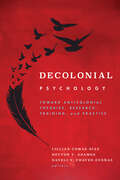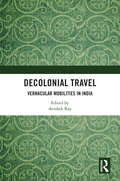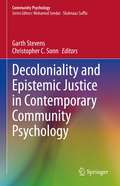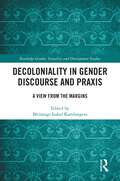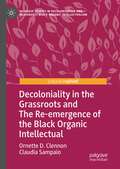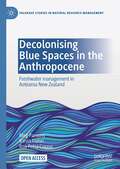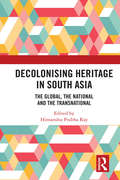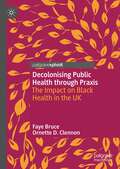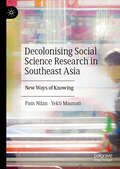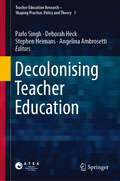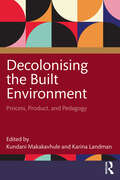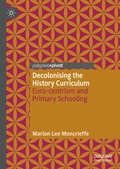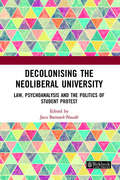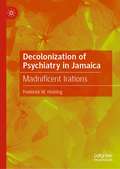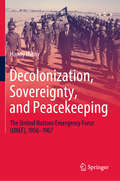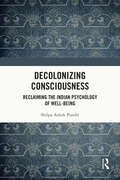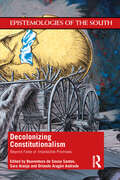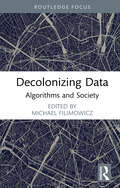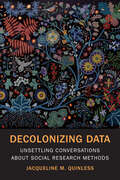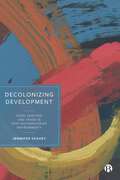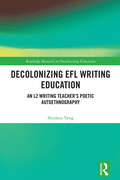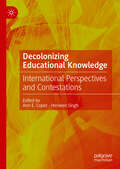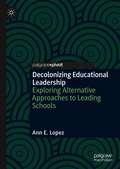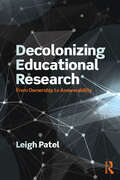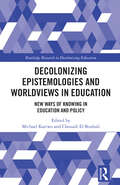- Table View
- List View
Decolonial Psychology: Toward Anticolonial Theories, Research, Training, and Practice (Cultural, Racial, and Ethnic Psychology Series)
by Hector Y. Adames Lillian Comas-Díaz Nayeli Y. Chavez-DueñasThis book offers an expert synthesis of the scholarly literature on approaches to decolonial psychology, its historical foundations, education and training, and psychological practice. From its inception, psychological science and practice in the United States has been framed predominantly by Eurocentric epistemologies. As a result, oppressed people have internalized the belief that their culture and values are inferior to those of dominant groups. Infusing a decolonial lens into psychology is one way for the field to become more inclusive and relevant to the numerical majority worldwide. Decolonial psychology creates space and methods for oppressed and impoverished communities to radically imagine their existence outside of the superimposed borders of coloniality, neoliberalism, racism, and other systems of oppression. It emphasizes how people's subjectivity and connections to diverse social groups are influenced by history, context, and oppression; how these populations actively resist and survive attacks on their humanity; and how knowledge production is shaped not only by how data is interpreted but also by the questions asked. The chapters in this book provide an opportunity for readers to deepen their understanding of how colonization and coloniality impacted knowledge creation in society and the field of psychology, including thought-provoking resources that explore the subject matter. The book also underscores how coloniality continues to reverberate in many aspects of psychology today. Collectively, the authors invite readers to resist engaging in psycolonization by generating ideas and pathways to help reclaim, honor, and celebrate Indigenous ways of knowing and being. The volume offers guidance on methods to disrupt psycolonization and its epistemic violence, helping to provide a roadmap to decolonial psychology and anticolonial futures. It is time to confront the limitations of mainstream psychology. This book will help psychologists at all levels anchor their research, teaching, and practice in decolonial methods and practices.
Decolonial Travel: Vernacular Mobilities in India
by Avishek RayThis volume brings together scholarship on indigenous forms of travel to decolonize travel theory. It looks at certain minoritarian-vernacular traveling cults – very rarely examined – that compel us to rethink, on the one hand, the conventional tropes of and rationales for travel; and, on the other hand, notions of (post)coloniality, nationalism and modernity in the context of India. The book illustrates the enduring problematic of the ‘colonial episteme’: how it deploys pervasive categories through which travel practices are sought to be understood, and why such categories are inadequate in accounting for the vernacular traveling cults in question. In studying the vernacular world-making in and through these cults, this book offers critical insights on how they defy the log(ist)ics of the ‘imperial categories’ and why they must be read as expressions of decoloniality. An important contribution to travel studies, the book will be an indispensable resource for students and researchers of South Asian studies, travel theory, Indian literary and cultural studies, cultural history and anthropology, sociology, and decoloniality.
Decoloniality and Epistemic Justice in Contemporary Community Psychology (Community Psychology)
by Christopher C. Sonn Garth StevensThis book examines the ways in which decolonial theory has gained traction and influenced knowledge production, praxis and epistemic justice in various contemporary iterations of community psychology across the globe. With a notable Southern focus (although not exclusively so), the volume critically interrogates the biases in Western modernist thought in relation to community psychology, and to illuminate and consolidate current epistemic alternatives that contribute to the possibilities of emancipatory futures within community psychology. To this end, the volume includes contributions from community psychology theory and praxis across the globe that speak to standpoint approaches (e.g. critical race studies, queer theory, indigenous epistemologies) in which the experiences of the majority of the global population are more accurately reflected, address key social issues such as the on-going racialization of the globe, gender, class, poverty, xenophobia, sexuality, violence, diasporas, migrancy, environmental degradation, and transnationalism/globalisation, and embrace forms of knowledge production that involve the co-construction of new knowledges across the traditional binary of knowledge producers and consumers. This book is an engaging resource for scholars, researchers, practitioners, activists and advanced postgraduate students who are currently working within community psychology and cognate sub-disciplines within psychology more broadly. A secondary readership is those working in development studies, political science, community development and broader cognate disciplines within the social sciences, arts, and humanities.
Decoloniality in Gender Discourse and Praxis: A View from the Margins (Routledge ISS Gender, Sexuality and Development Studies)
by Mtisunge Isabel KamlongeraThis book showcases Global South theorizations and understandings of gender.By taking voices from the margins and putting them center stage, this book provides an important example of decoloniality in action, challenging a field that continues to be rooted in Western Feminist epistemology. This book first analyzes the history and development of gender discourse, before going on to investigate non-Western philosophy and frameworks around gender. Each chapter presents instances of decoloniality in action, with possible retheorizations and rationalizations of how to be decolonial within gender discourse and praxis. This book concludes by considering what the future implications of a truly decolonial gender discourse and praxis would be.Offering detailed empirical accounts of decoloniality in action, this book will be a useful guide for researchers of gender and post-colonial studies.
Decoloniality in the Grassroots and The Re-emergence of the Black Organic Intellectual (Palgrave Studies in Decolonisation and Grassroots Black Organic Intellectualism)
by Ornette D. Clennon Claudia SampaioThis book explores the relationship between "the roles of the Black “organic intellectual” and the PoC academic scholar, and outlines how important partnerships are emerging from these sometimes-contrasting decolonial praxes. By blending the decolonial processes of Indigenous rights via a liberation Psychology lens, Brazilian critical race scholarship and UK African diasporic collective consciousness via intersectional critical race studies, the authors provide a clear theoretical framework to show how a decolonised multi-layered community epistemology can be produced by the community for the community that in praxis form, can be employed for the fight for social justice within those communities.
Decolonising Blue Spaces in the Anthropocene: Freshwater management in Aotearoa New Zealand (Palgrave Studies in Natural Resource Management)
by Karen Fisher Meg Parsons Roa Petra CreaseThis open access book crosses disciplinary boundaries to connect theories of environmental justice with Indigenous people’s experiences of freshwater management and governance. It traces the history of one freshwater crisis – the degradation of Aotearoa New Zealand’s Waipā River– to the settler-colonial acts of ecological dispossession resulting in intergenerational injustices for Indigenous Māori iwi (tribes). The authors draw on a rich empirical base to document the negative consequences of imposing Western knowledge, worldviews, laws, governance and management approaches onto Māori and their ancestral landscapes and waterscapes. Importantly, this book demonstrates how degraded freshwater systems can and are being addressed by Māori seeking to reassert their knowledge, authority, and practices of kaitiakitanga (environmental guardianship). Co-governance and co-management agreements between iwi and the New Zealand Government, over the Waipā River, highlight how Māori are envisioning and enacting more sustainable freshwater management and governance, thus seeking to achieve Indigenous environmental justice (IEJ). The book provides an accessible way for readers coming from a diversity of different backgrounds, be they academics, students, practitioners or decision-makers, to develop an understanding of IEJ and its applicability to freshwater management and governance in the context of changing socio-economic, political, and environmental conditions that characterise the Anthropocene.
Decolonising Heritage in South Asia: The Global, the National and the Transnational
by Himanshu RayThis volume cross-examines the stability of heritage as a concept. It interrogates the past which materialises through multi-layered narratives on monuments and other objects that sustain cultural diversity. It seeks to understand how interpretations of “monuments” as “texts” are affected at the local level of experience, even as institutions such as UNESCO work to globalise and fix constructs of stable and universal heritage. Shifting away from a largely Eurocentric concept associated with architecture and monumental archaeology, this book reassesses how local and regional heritage needs to be balanced with the global and transnational. It argues that material objects and monuments are not static embodiments of culture but are, rather, a medium through which identity, power and society are produced and reproduced. This is especially relevant in South and Southeast Asian contexts, where debates over heritage often have local, regional and national political implications and consequences. Reevaluating how traditional valuation of monuments and cultural landscapes could help aid sustainability and long-term preservation of the heritage, this book will be useful for scholars and researchers of South and Southeast Asian history, heritage studies, archaeology, cultural studies, tourism studies and political history as well.
Decolonising Public Health through Praxis: The Impact on Black Health in the UK
by Ornette D. Clennon Faye BruceThis book provides an interdisciplinary analysis of UK African Diaspora health seekers and their sustained health inequalities in the health market. It translates their often-silenced voices into a decolonial praxis, where their experiences illuminate the hidden factors that have blighted change in health outcomes for these communities. The book excavates and breaks down the nature of these hidden factors, as historical patterns of behaviour that comprise whiteness over the longue durée. Using the lenses of decolonial and critical race studies, the book places whiteness within an ethical and moral framework in order to examine the hidden factors behind health inequalities. The book also looks at intersectionality and discusses whether it is actually fit for purpose as an analytical framework for discussing the health seeking behaviours of both Black men and Black women in relation to their unequal access to the health market.
Decolonising Social Science Research in Southeast Asia: New Ways of Knowing
by Pam Nilan Yekti MaunatiThis book draws together some of the most innovative studies in contemporary Southeast Asian research by social science scholars in the region. Themes include gender, popular culture, democratic struggle, climate change and environment, minority representation, wealth and marginalisation, labour migration, and ASEAN – the Association of Southeast Asian Nations. Readers can glimpse, in a single volume, the nature and scope of the ground-breaking research being conducted across the diverse set of countries in the region. The authors have assembled a set of chapters that represent not only new insights, but new ways of knowing. The aim is to illuminate important steps in the decolonisation of social science research in Southeast Asia. This is an essential resource for all social science scholars and students who want to keep up with epistemological innovation across the Southeast Asian region.
Decolonising Teacher Education (Teacher Education Research – Shaping Practice, Policy and Theory #1)
by Angelina Ambrosetti Deborah Heck Parlo Singh Stephen HeimansThis book makes a deliberate attempt to explore the complexity of decolonising theories in teacher education. It draws attention to the historical and emerging impacts of colonialism on educational institutions and practices, challenging educators to expand their understanding of diverse trajectories of decolonial research both theoretically and practically. It adds to the discussions and dialogues between different disciplinary traditions, such as postcolonial and decolonial studies, as well as critical Indigenous and critical race studies. As an international compilation, it offers educators a unique opportunity to envision teacher education through alternative lenses—rethinking the relationship between ontology-epistemology-ethics, that is, what constitutes knowledge, how it is produced, and what material worlds are constructed in and through knowledge / research systems. Through compelling examples, this book illustrates how educators have navigated epistemic injustices within the field of teacher education amidst the rising global demands for standardisation. It encourages teacher educators to explore alternative theories within their own contexts, crafting new teacher education practices in universities and schools.
Decolonising the Built Environment: Process, Product, and Pedagogy
by Karina Landman Kundani MakakavhuleDecolonising the Built Environment: Process, Product, and Pedagogy provides an important and much-needed comprehensive overview of how decolonisation is shaping the built environment in theory, in practice, and as a process/project today. The contributors provide an inclusive and trans-national conversation between a diverse set of academics, design practitioners and thinkers, and activists. This book is structured around three thematic and practical categories: Part 1 studies decolonisation conceptually; Part 2 studies decolonisation as a process; and Part 3 studies the products of decolonisation as materialised in the form of buildings, urban design, planning, policy, and social practices.Essential reading for students, teachers, and practitioners, this book presents the project of decolonisation as a pedagogy and an ongoing process.
Decolonising the History Curriculum: Euro-centrism and Primary Schooling
by Marlon Lee MoncrieffeThis book calls for a reconceptualisation and decolonisation of the Key Stage 2 national history curriculum. The author applies a range of theories in his research with White-British primary school teachers to show how decolonising the history curriculum can generate new knowledge for all, in the face of imposed Eurocentric starting points for teaching and learning in history, and dominant white-cultural attitudes in primary school education. Through both narrative and biographical methodologies, the author presents how teaching and learning Black-British history in schools can be achieved, and centres his Black-British identity and minority-ethnic group experience alongside the immigrant Black-Jamaican perspective of his mother to support a framework of critical thinking of curriculum decolonisation. This book illustrates the potential of transformative thinking and action that can be employed as social justice for minority-ethnic group children who are marginalized in their educational development and learning by the dominant discourses of British history, national building and national identity.
Decolonising the Neoliberal University: Law, Psychoanalysis and the Politics of Student Protest
by Jaco Barnard-NaudéTaking the postcolonial – or, more specifically, the post-apartheid – university as its focus, the book takes the violence and the trauma of the global neoliberal hegemony as its central point of reference. Following a primarily psychoanalytic line of enquiry, it engages a range of disciplines – law, philosophy, literature, gender studies, cultural studies and political economy – in order better to understand the conditions of possibility of an emancipatory, or decolonised, higher education. And this in the context of both the inter-generational transmission of the trauma of colonialism, on the one hand, and, on the other, the trauma of neoliberal subjectivity in the postcolonial university. Oriented around an important lecture by Jacqueline Rose, the volume contains contributions from world-renowned authors, such as Judith Butler and Achille Mbembe, as well as numerous legal and other theorists who share their concern with interrogating the contemporary crisis in higher education. This truly interdisciplinary collection will appeal to a wide range of readers right across the humanities, but especially those with substantial interests in the contemporary state of the university, as well as those with theoretical interests in postcolonialism, psychoanalysis, gender studies, cultural studies, jurisprudence and law.
Decolonization of Psychiatry in Jamaica: Madnificent Irations
by Frederick W. HicklingThis book traces the historical postcolonial journey of four generations of Jamaican psychiatrists challenging the European colonial ‘civilizing mission’ of psychiatric care. It details the process of deinstitutionizing patients with chronic mental illness using psychohistoriographic cultural therapy, by engaging them in creating sociodrama and poetry writing, not only to express and reverse the stigma contributing to their marginalized status, but also to reconnect them to a centuries-long history of oppression. The author thereby demonstrates that psychological decolonization requires a seminal understanding of the complex mental inter-relationship between slaves and slaveowners. Further, it is shown how the model analyzes the antipodal dialectic history of descendants of Africans enslaved in the New World by brutish British Imperialists suffering from the European psychosis of white supremacy. Drawing together a detailed description of the sociopoem Madnificent Irations, with an examination of Jamaica’s political and social history, and the author’s personal experience, this compelling work marks an important contribution to decolonial literature. It will be of particular interest to students and scholars of postcolonial studies, critical race theory, the history of psychology and community psychology.
Decolonization, Sovereignty, and Peacekeeping: The United Nations Emergency Force (UNEF), 1956–1967
by Hanny HilmyThis book analyses three major themes: decolonization, sovereignty, and peacekeeping. Their interaction during the national liberation struggle during the Cold War, culminating in the 1956 Suez War, addresses the principle of national sovereignty after World War II in the framework of the UN Charter. The new peacekeeping operations were used in many conflicts, during which the Charter’s theory and application were tested. The rise of the USA as the key Western power and Israel’s special role in the Middle East have created a new confrontational dynamic for the entire region. The interaction between the book’s main themes in the field has led to the principles of peacekeeping in international and national conflicts being reviewed in light of the discredited ‘Capstone Doctrine’. The author argues that state sovereignty is sacrosanct, but humanitarian interventions are equally imperative in his view. Striking the right balance is crucial for managing conflicts. The author:· offers a well-informed historical account and an authoritative political analysis· was exposed to UNEF deployments and termination and knows key peacekeeping actors· draws on original documents, memoirs, and interviews· includes unpublished photos and previously unavailable documentary material · has experience in government and academia
Decolonizing Consciousness: Reclaiming the Indian Psychology of Well-being
by Shilpa Ashok PanditThe book intertwines several strands of scholarship in Indian Philosophy, contemporary psychology and the lived Indian psychological practice inclusive of Yoga, advaita, tantra and bhakti to engage in an exploration of consciousness, cognitive science and philosophy. The book examines the characteristics of consciousness by situating it in the historical and cultural contexts of Euro-American as well as Asian, particularly Indian philosophical tradition specifically, the Bhakti tradition and creative living. The volume decolonizes the understanding of the ecology of consciousness while accounting for the diverse strands, which have given us a unique understanding of the mind, psychology, cognition and philosophy of the mind. This book will be of interest to students, teachers, and scholars of psychology, consciousness studies, cognitive science, philosophy, social psychology, Yoga studies, and Yoga psychology. It will also be useful for Yoga professionals, social workers, therapists, and anyone who is interested to learn about consciousness.
Decolonizing Constitutionalism: Beyond False or Impossible Promises (Epistemologies of the South)
by Sara Araújo Orlando Aragón Andrade de Sousa Santos, BoaventuraThe modern state, law, and constitution result from a legal canon that (re)produces the abyssal lines dividing the world that is validated from the world whose humanity and epistemological validity are denied. This book aims to contribute to a post-abyssal reflection on law and constitutionalism by considering the structural axes of power that are constitutive of modern law “capitalism, colonialism, and heteropatriarchy” alongside the legal plurality of the world. Is it possible to decolonize, decommodify, and depatriarchalize the constitution? The authors speak from multiple geographies, raise different questions, resort to differentiated theoretical approaches, and reveal varying levels of optimism about the possibilities of transforming constitutions. The readers are confronted with critical perspectives on the Eurocentric legal canon, as well as with the recognition of anti-capitalist, anti-colonial, and anti-patriarchal legal experiences. The horizon of this publication is the expansion of the possibilities of legal and political imagination.
Decolonizing Data: Algorithms and Society (Algorithms and Society)
by Michael FilimowiczThis book focuses on the values and effects that are operational in data technologies as they sustain colonial and imperialist legacies while also highlighting strategies for resistance to autocratic regimes and pathways towards decolonizing efforts. Systems and schemes for databases and automated data flow processing often contain implicitly Westernized, autocratic or even imperialist features, but can also be appropriated for resistance and revolt. Algorithms are not strictly mathematical but also embody cultural constructs. Values circulate in systems along with labels and quantities. This entails more critically reflective data practices whether in government, academia, industry or the civic sphere. The volume covers a critique of the data colonialism thesis which frames computer science as a colonizing science that uses data to classify and govern us, an alternate framing of metadata as ‘data near data’ to challenge seemingly neutral technical terms, and a case study of the use of social media platforms in the 2018 Sudanese uprising. Scholars and students from many backgrounds, as well as policy makers, journalists and the general reading public will find a multidisciplinary approach to questions posed by data decolonization research from the fields of Communication and Digital Media studies.
Decolonizing Data: Unsettling Conversations about Social Research Methods
by Jacqueline M. QuinlessDecolonizing Data explores how ongoing structures of colonialization negatively impact the well-being of Indigenous peoples and communities across Canada, resulting in persistent health inequalities. In addressing the social dimensions of health, particularly as they affect Indigenous peoples and BIPOC communities, Decolonizing Data asks, Should these groups be given priority for future health policy considerations? Decolonizing Data provides a deeper understanding of the social dimensions of health as applied to Indigenous peoples, who have been historically underfunded in and excluded from health services, programs, and quality of care; this inequality has most recently been seen during the COVID-19 pandemic. Drawing on both western and Indigenous methodologies, this unique scholarly contribution takes both a sociological perspective and the "two-eyed seeing" approach to research methods. By looking at the ways that everyday research practices contribute to the colonization of health outcomes for Indigenous peoples, Decolonizing Data exposes the social dimensions of healthcare and offers a careful and respectful reflection on how to "unsettle conversations" about applied social research initiatives for our most vulnerable groups.
Decolonizing Development: Food, Heritage and Trade in Post-Authoritarian Environments
by Jennifer KeaheyPost-Soviet Latvia and post-apartheid South Africa are far apart geographically and yet have endured a similar history of colonial and authoritarian rule before transitioning to democracy at the end of the 20th century. This book examines these two nations in an unusual comparative study of post-authoritarian efforts to decolonize production and trade. The book combines an analysis of political economy and ecocultural heritage to unpack alternative trade formations. It also connects world systems thinking with Indigenous knowledge to articulate a decolonial theory of development and change over the longue durée. Conclusions and insights drawn are timely and important for a planet confronted by crises such as authoritarianism, laissez-faire capitalism, climate change and the COVID-19 pandemic.
Decolonizing EFL Writing Education: An L2 Writing Teacher's Poetic Autoethnography (Routledge Research in Decolonizing Education)
by Shizhou YangArguably the first book-length exploration of decolonizing English as a Foreign Language (EFL) writing education, this novel volume uses poetic autoethnography to provide a situated, dynamic, and complex view of multilingual writers through their second language (L2) academic writing and creative writing.Responding to contemporary calls to decolonize L2 writing as a field and diversify academic writing for multilingual students, this book is the first of its kind to explore the decolonization of EFL writing education from a Global Southern context. Chapters critically and creatively consider issues of educational technologies, translanguaging, academic writing, epistemology, and pedagogy from two writing courses from a Global South and classroom writing ecology perspective. Using poetic autoethnography alongside data from authentic writing classrooms in Thailand, the book posits that emergent translanguaging literature can be cultivated for decolonization purposes, critiquing and providing decolonial options in such areas as monolingual ideology, freewriting, student identity, and mind.Empowering EFL writing teachers to raise students’ critical awareness of issues such as writing, culture, and coloniality, this book will be of key interest to researchers, scholars, and postgraduate students in the fields of applied linguistics, Teaching English to Speakers of Other Languages (TESOL), L2 writing, multilingual education, and language policy and planning.
Decolonizing Educational Knowledge: International Perspectives and Contestations
by Ann E. Lopez Herveen SinghThis volume explores theories and practices of decolonizing education, drawing on international perspectives from scholars across the globe to engage new knowledges and build solidarities across different spaces. Decolonization is an ongoing process in which educators, community members, and practitioners alike have a stake in challenging Eurocentric paradigms and ways of knowing. The book showcases the contributions of praxis-oriented scholars and practitioners who seek to engage in decolonizing praxis that unsettles educational norms, forging new ways of thinking about teaching, learning, and leadership.
Decolonizing Educational Leadership: Exploring Alternative Approaches to Leading Schools
by Ann E. LopezThis book offers new ways of engagement for leaders seeking to connect theory to practice in decolonizing education. In the current climate where xenophobia, anti-immigrant sentiments, and other forms of exclusion make up much of the discourse, educational leaders need to seek ways to foreground other forms of knowledge and transfer them into their daily leadership practices. Lopez contributes to other critical leadership approaches while foregrounding a decolonizing approach that unsettles the coloniality manifested in education and school practices. Chapters provide school leaders with examples of ways they can challenge coloniality, white supremacy, and other forms of oppression in schooling that negatively impact some students and their educational outcomes.
Decolonizing Educational Research: From Ownership to Answerability (Series in Critical Narrative)
by Leigh PatelDecolonizing Educational Research examines the ways through which coloniality manifests in contexts of knowledge and meaning making, specifically within educational research and formal schooling. Purposefully situated beyond popular deconstructionist theory and anthropocentric perspectives, the book investigates the longstanding traditions of oppression, racism, and white supremacy that are systemically reseated and reinforced by learning and social interaction. <P><P>Through these meaningful explorations into the unfixed and often interrupted narratives of culture, history, place, and identity, a bold, timely, and hopeful vision emerges to conceive of how research in secondary and higher education institutions might break free of colonial genealogies and their widespread complicities.
Decolonizing Epistemologies and Worldviews in Education: New Ways of Knowing in Education and Policy (Routledge Research in Decolonizing Education)
by Chouaib El Bouhali Michael KariwoThis edited volume examines the decolonization of worldviews and ways of knowing in education and educational policy. It critically challenges the Western interpretation of epistemology and ontology, providing a platform for contributors to demonstrate how concepts of decolonization, knowledge and worldviews are understood, as well as the impact of these understandings in creation of policies and practices in education and pedagogy. It also offers insight into related themes on student resilience, English language, the internationalization of western knowledge, indigenous paradigms, and curriculum transformation. Chapter authors present new understandings of decolonizing knowledge and diversity, analysis of non-Western and indigenous epistemologies and worldviews, and examples of implementation of equity in policy and education through case studies. Creating and initiating a platform for wider debate, it will ultimately appeal to scholars, researchers, policy makers and educational leaders concerned with decolonizing education and policy in North America and beyond, and with interests in indigenous education, decolonizing education, sociology of education, and philosophy of education.
